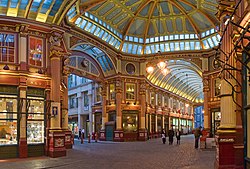 The central interior of Leadenhall Market The central interior of Leadenhall Market | |
| Location | City of London, England |
|---|---|
| Coordinates | 51°30′46″N 0°05′01″W / 51.5128°N 0.0835°W / 51.5128; -0.0835 |
| Address | Gracechurch Street, London EC3V 1LT |
| Opening date | 14th century |
| Website | leadenhallmarket |

Leadenhall Market is a covered market in London, England, located on Gracechurch Street but with vehicular access also available via Whittington Avenue to the north and Lime Street to the south and east, and additional pedestrian access via a number of narrow passageways.
It is one of the oldest markets in London, dating from the 14th century, and is located in the historic centre of the City of London financial district.
History
The market dates from the 14th century and is said to derive its name from Leather-hall, though it is disputable. The early history of Leaden Hall involves the Mayor (1446), Simon Eyre. According to John Stow, "Eyre, a draper built Leaden Hall for a common garner of corn for the use of this city".
The Market is typically open weekdays from 10 am until 6 pm, and primarily sells fresh food; among the vendors there are cheesemongers, butchers and florists. Originally a meat, game and poultry market, it stands on what was the centre of Roman London. A number of commercial retailers are also located in the market, including clothes shops. The Lamb Tavern, dating from 1780, is a traditional gathering place for insurance industry workers, many of whom work at Lloyd's of London adjacent to Leadenhall Market.
The ornate roof structure, painted green, maroon and cream, and cobbled floors of the current structure, designed in 1881 by Sir Horace Jones (who was also the architect of Billingsgate and Smithfield Markets), make Leadenhall Market a tourist attraction.
The main entrance to the market is on Gracechurch Street. The double height entrance is flanked by tall, narrow gabled red brick and Portland stone blocks in a 17th-century Dutch style. The adjacent buildings to the south have a continuous retail frontage which is punctuated by narrow entrances to pedestrian ways into the market.
Between 1990 and 1991 the market received a dramatic redecoration which improved its appearance, enhancing its architectural character and detail. The redecoration scheme received a special mention in the Civic Trust Awards in 1994. The market is a Grade II* listed building, being listed in 1972.
It was used to represent the area of London near the Leaky Cauldron and Diagon Alley in the film Harry Potter and the Philosopher's Stone (2001) and is featured in the films The Imaginarium of Doctor Parnassus (2009), Hereafter (2010), Brannigan (1975), Hidden City (1987) and Love Aaj Kal (2009). It was also used in the music video for the 1991 Erasure song "Love to Hate You".
Leadenhall Market formed part of the marathon course of the 2012 Olympic Games; runners passed through the market from Whittington Avenue to Lime Street.
Furthermore, it is featured in Mario Kart Tour and Mario Kart 8 Deluxe as part of the London Loop Course .
Nearest public transit access: Monument or Bank on the Underground, Fenchurch Street or Cannon Street on the Overground.
Gallery
-
 Main entrance from the Illustrated London News, 1881
Main entrance from the Illustrated London News, 1881
-
 The interior from the Illustrated London News, 1881
The interior from the Illustrated London News, 1881
-
 West entrance, from Gracechurch Street
West entrance, from Gracechurch Street
-
 North entrance, from Whittington Avenue off Leadenhall Street
North entrance, from Whittington Avenue off Leadenhall Street
-
Market ceiling, 2010
-
Night view with a fish-eye lens
-
View during the day
-
 Black and white interior of Leadnhall Market
Black and white interior of Leadnhall Market
See also
References
- Wedgwood, Hensleigh (1855). "On False Etymologies". Transactions of the Philological Society (6): 67.
- J. Stow, A Svrvay of London (John Windel, Printer to the Citie of London, 1603), p. 155-6 (Google).
- "Honour of Citizens and worthines of men | British History Online". www.british-history.ac.uk.
- ^ Leadenhall Market Archived 31 October 2012 at the Wayback Machine (City of London) accessed 30 September 2009
- Merlin, Chip. "Lloyd's Marketplace of Interaction and Lloyd's Pubs". Merlin Law Group. Retrieved 9 May 2024.
- Finch, Gavin. "The Old Daytime-Drinking, Sexual-Harassing Ways Are Thriving at Lloyd's". Bloomberg.com. Retrieved 9 May 2024.
- Stuff, Good. "Leadenhall Market with Subsidiary Numbering, City of London, London, London". britishlistedbuildings.co.uk.
- "Men's Marathon - Olympic Athletics Course Map | London 2012". Archived from the original on 30 April 2013. Retrieved 30 May 2015.
- "Women's Marathon - Olympic Athletics Course Map | London 2012". Archived from the original on 2 May 2013. Retrieved 30 May 2015.
- Stuff, Good. "London Loop , City of London". mariowiki.com.